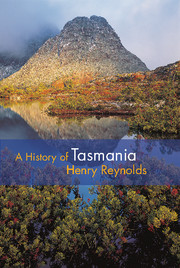Book contents
- Frontmatter
- Contents
- Illustrations
- Acknowledgements
- Introduction
- 1 First Meetings, Extraordinary Encounters
- 2 Van Diemen's Land: Settling in the enviable island
- 3 The Black War: The tragic fate of the Tasmanian Aborigines
- 4 An Indelible Stain?
- 5 The Triumph of Colonisation
- 6 The Politics of Van Diemen's Land
- 7 The Convict System
- 8 Post-penal Depression, 1856–70
- 9 Reform and Recovery
- 10 Federation and War
- 11 Between the Wars
- 12 Postwar Tasmania
- 13 Towards the Bicentenary
- Notes
- Sources
- Index
6 - The Politics of Van Diemen's Land
Published online by Cambridge University Press: 05 April 2012
- Frontmatter
- Contents
- Illustrations
- Acknowledgements
- Introduction
- 1 First Meetings, Extraordinary Encounters
- 2 Van Diemen's Land: Settling in the enviable island
- 3 The Black War: The tragic fate of the Tasmanian Aborigines
- 4 An Indelible Stain?
- 5 The Triumph of Colonisation
- 6 The Politics of Van Diemen's Land
- 7 The Convict System
- 8 Post-penal Depression, 1856–70
- 9 Reform and Recovery
- 10 Federation and War
- 11 Between the Wars
- 12 Postwar Tasmania
- 13 Towards the Bicentenary
- Notes
- Sources
- Index
Summary
Soon after The Elphinstone dropped anchor in Sullivan's Cove on Tuesday, 24 May 1836, the news spread like wildfire: after 12 years in the colony Governor Arthur had been recalled. Boyes noted in his diary that the news was all over town in half an hour. He believed that it seemed ‘to diffuse general joy’. Arthur's enemies were exultant, many claiming, and probably believing, that their incessant agitation had precipitated the recall. In Hobart and Launceston members of the informal political Opposition gathered for celebratory dinners where many speeches were delivered and even more toasts drunk. In the north, the Cornwall Chronicle published a special supplement with banner headlines that declared:
REJOICE
For the day of
RETRIBUTION
Has
ARRIVED
The editor declared that
Tomorrow ought to be a day of general THANKSGIVING!
For the deliverance from the iron hand of GOVERNOR ARTHUR.
We have now the prospect of breathing. The accursed gang of blood
suckers will be destroyed…and a gang of Felons will be no longer
permitted to violate the LAWS OF CIVILIZED SOCIETY.
In Hobart the opposition paper, the Colonial Times, headed its editorial ‘Oh Joyous News’, and then went on to declare that it was ‘with the utmost satisfaction that the inhabitants of Hobart Town welcomed the happy intelligence…that Colonel Arthur is forthwith to be removed from this Government’.
- Type
- Chapter
- Information
- A History of Tasmania , pp. 112 - 136Publisher: Cambridge University PressPrint publication year: 2011



